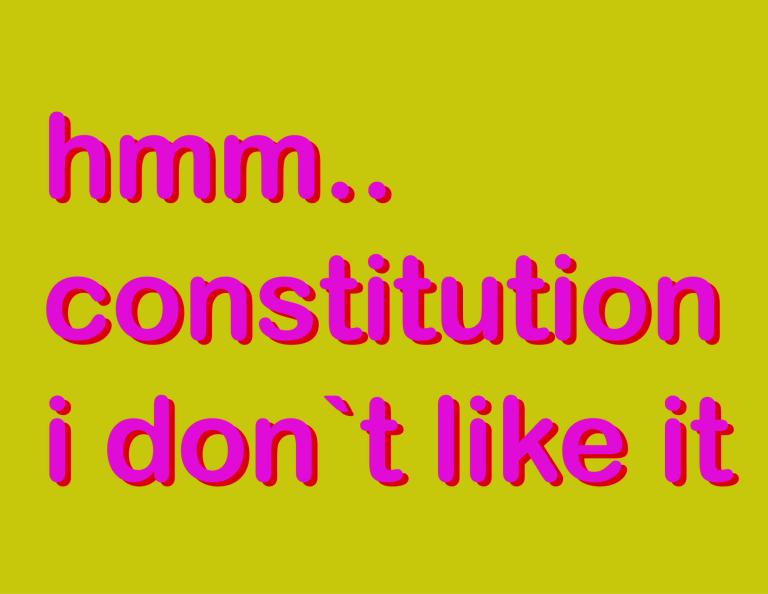Progressives are accusing conservatives promoting voting security as “attacking our democracy.” And they brand Trump supporters who rioted at the Capitol as “insurrectionists” who tried to “overthrow our government.” But some progressives are openly calling for the overthrow of our government. They are doing so by advocating the elimination of our Constitution and replacing it with a system of government that they think will better advance their causes.
We have blogged about proposals to replace our Constitution before. But now there are calls to eliminate all constitutions in favor of pure majority-rules democracy.
George Washington University law professor Jonathan Turley, in article on the subject, cites MSNBC commentator and the Nation’s correspondent Elie Mystal who called the Constitution “trash.” He also cited Georgetown law professor Rosa Brooks for saying that we are “slaves” to the Constitution, which has become the problem for our country.
Their main complaint and that of other progressives is that the Constitution was “written by slave owners.” Such an ad hominem argument is not, strictly speaking, factual, since the Constitution is a collectively written document originally ratified by abolitionist representatives as well as slave owners and amended over the course of American history. Those who read the Constitution will find that the 13th Amendment (1865) eliminates slavery, the 14th Amendment (1868) affirms the rights of all Americans regardless of race, and the 15th Amendment (1870) forbids limiting the right to vote on account of race.
But Turley brings up a more sophisticated critique of the Constitution and of American “Constitutionalism.” The New York Times recently published an opinion piece by Harvard law professor Ryan D. Doerfler and Yale law professor Samuel Moyn entitled The Constitution Is Broken and Should Not Be Reclaimed.
The authors chastise their fellow liberals for trying to “reclaim” the Constitution with progressive legal theories or tinkering with the Supreme Court or making other changes. “The real need,” they say, “is not to reclaim the Constitution, as many would have it, but instead to reclaim America from constitutionalism.”
The idea of constitutionalism is that there needs to be some higher law that is more difficult to change than the rest of the legal order. Having a constitution is about setting more sacrosanct rules than the ones the legislature can pass day to day. . . .
But constitutions — especially the broken one we have now — inevitably orient us to the past and misdirect the present into a dispute over what people agreed on once upon a time, not on what the present and future demand for and from those who live now. This aids the right, which insists on sticking with what it claims to be the original meaning of the past. . . .
One reason for these woeful outcomes is that our current Constitution is inadequate, which is why it serves reactionaries so well. Starting with a text that is famously undemocratic, progressives are forced to navigate hard-wired features, like the Electoral College and the Senate, designed as impediments to redistributive change while drawing on much vaguer and more malleable resources like commitments to due process and equal protection. . . .
By leaving democracy hostage to constraints that are harder to change than the rest of the legal order, constitutionalism of any sort demands extraordinary consensus for meaningful progress.
This mindset would work against the project some progressives are pursuing of writing a new constitution, since that too would involve “constitutionalism.” What Doerfler and Moyn advocate in their essay is pure democracy, governance by statute, based on majoritarian rule alone. They exhibit a naive assumption that the majority at any given time will be progressive and will advance the progressive agenda. Sometimes a majority of Americans vote for Barack Obama and sometimes a majority vote for Ronald Reagan. One majoritarian government would likely dismantle the achievements of the previous government.
Even more problematic is that pure majority rule has no provision to protect the rights of minorities. Including the racial minorities progressives profess to defend. Without an overarching system of legal rights, which can overrule particular majority-passed laws–that is to say, without constitutionalism–minorities would have no protections whatsoever.
The authors say that we can break out of constitutionalism not by packing the Supreme Court–which continues to play the constitutionalist game–but to “pack the Union with new states.”
That link is to an astonishing article in the Harvard Law Review that advocates not just admitting the District of Columbia as a state, which can be done by a majority vote in Congress, but admitting its 127 neighborhoods as separate states! After all, the author frankly states, D.C. is reliably Democratic. Those 127 new states, or perhaps fewer, grouped into different configurations but enough to constitute with other blue states 3/4 of the states necessary to amend the Constitution, would then pass amendments that would dismantle constitutionalism by turning the Senate into an advisory body like the House of Lords and make other changes to turn America into a pure democracy.
Again, the naiveté is breath-taking. Those 127 states, under the current constitution, would have 254 senators and 255 electoral votes! The District of Columbia would have complete dominion over all of the other 50 states. Why would they give that up?
Plus, the talk of states raises the question of what would become of them? Would there still be state and local governments, each governed by majority of voters? If so, progressives would not like what some states would likely vote to do. Or is the idea that the whole nation would vote on laws for everybody? In which case, there would be no need for states at all. But that would effectively cut off local citizens from the ruling government, which would be far away and many times more powerful. This undermines the very virtues of democracy, in which people have a say in their government and choose their rulers. D.C., the big cities, and the populous coasts would have unlimited power, but citizens in flyover country would be cut off from democracy. This would be even worse in the absence of “constitutionalist” rights and processes to protect citizens and to sort out the jurisdictions.
Notice how this movement among progressives accounts for the aptly-named Democrats’ rhetoric on the “threats to democracy.” Not threats to the Constitution, though politicians in that party will have sworn to “protect and defend” that document in their oaths of office, nor threats to individual rights. Democracy is separable from those concepts in the minds of many progressives, and they are willing to sacrifice them accordingly.
Prof. Turley gives other problems with eliminating “constitutionalism” in favor of pure democracy. He quotes James Madison, the father of American “constitutionalism””
Pure democracies have ever been spectacles of turbulence and contention; have ever been found incompatible with personal security or the rights of property; and have in general been as short in their lives as they have been violent in their deaths. (Federalist 10)
Furthermore, as Plato notes, drawing on the history of Greek city states, pure democracies almost always devolve into tyranny. But perhaps, for some on the Left, that would be not a bug but a feature.
HT: Paul Veith
Image by Mara_J via depositphotos.com, attributed free license














